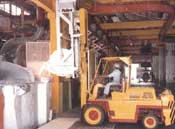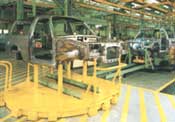Manufacturing solutions
By Kiron Kasbekar | 08 Feb 2002
 Telco Automation, or TAL, was, until April 2000, a division of Tata Engineering, better known as Telco. It was called the growth division, and there’s an interesting reason why.
Telco Automation, or TAL, was, until April 2000, a division of Tata Engineering, better known as Telco. It was called the growth division, and there’s an interesting reason why.Back in the 1960s, the Tata group planned to make a car with German collaboration. The growth division was created as a part of that plan — to make equipment used in the proposed car plant.
The car project did not take off, thanks to the government’s misplaced priorities, and the division began making components for Tata Engineering trucks. So, even though the car project was stymied, the division did contribute to the growth of the commercial vehicles business.
Time to go global
 "We were successful in a limited way in the closed environment in which we worked then," says Y Nath, the company’s managing director, who has been with Tata Engineering since 1966. "When Ratan Tata became chairman of Tata Engineering in 1991, he told us we had to become global. We had to stand on our own feet."
"We were successful in a limited way in the closed environment in which we worked then," says Y Nath, the company’s managing director, who has been with Tata Engineering since 1966. "When Ratan Tata became chairman of Tata Engineering in 1991, he told us we had to become global. We had to stand on our own feet."Essentially, the idea was that Tata Engineering couldn’t and shouldn’t be making everything in-house. The divisions that did make capital equipment and other things like software would have to be competitive if Telco’s trucks and cars had to be competitive.
It was this urge to "become global" that resulted in Telco spinning off several divisions in recent years. Its construction equipment division was separated to become Telco Construction Equipment Company. The IT division (earlier the management services division) became Tata Technologies. And the machine tool and mechanical equipment making business was hived off as TAL.
 Three and a half decades of experience have given TAL much strength. In Nath’s words, "Strong engineering capabilities, highly experienced human resources, excellent manufacturing facilities and access to a huge vendor base, experience in a wide range of production capacities, experience in integration of manufacturing facilities, manufacturing process knowledge, and capability of productionising machines and equipment."
Three and a half decades of experience have given TAL much strength. In Nath’s words, "Strong engineering capabilities, highly experienced human resources, excellent manufacturing facilities and access to a huge vendor base, experience in a wide range of production capacities, experience in integration of manufacturing facilities, manufacturing process knowledge, and capability of productionising machines and equipment."That experience still has to be translated into actual revenues. Considering that the company is new, and considering that the overall investment climate has not been too favourable in the past couple of years, it hasn’t done badly at all.
According to Nath, during the first year of operations, a major effort was carried out for obtaining orders. The company has projected a turnover of Rs 55-56 crore for the nine-month period to March 2002, and plans to achieve a turnover of Rs 150 crore by March 2005.
TAL, a wholly-owned subsidiary of Tata Engineering, sells its equipment to companies outside the Tata Group too, and expects to depend less and less on sales within the group.
Impressive portfolio
The company has demonstrated its expertise well. Visit Telco’s Indica car plant and you’ll see some of it. Telco could not have built the modern plant at such a low cost without the support from TAL. The plant uses a lot of robotics, and a substantial part of the robots, for example, were built by TAL, which has also supplied a wide range of other equipment to the plant, including conveyor systems, painting booths, furnaces, special purpose machines, test rigs, and fixtures of all types.
A visit to TAL’s own plants shows a wide array of equipment used. And you can see workers busy building a diverse range of machinery, from conveyor systems and heavy material handling equipment to special purpose machines.
Upstairs software engineers have their eyes glued to computers, working on sophisticated computer-aided design and engineering software to give shape to the components that go into the machines that are made in the workshops on the ground floor. The company also has a furnace to make large castings.
Integrated approach
Much as Nath is proud of the manufacturing and fabrication facilities that he manages, the key to his pitch is not the equipment. It is solutions for manufacturing.
Typically, TAL’s corporate brochure doesn’t highlight the fact that it makes equipment. It stresses that it is "a company focussed in offering solutions to its customers in the field of manufacturing engineering."
What this means is that TAL’s offering starts with detailed study of the client’s manufacturing process; analysis of all production costs; selection and recommendation of machines and equipment; supply of tools like dies, fixtures, production aids, and special purpose machines; erection and commission of all the equipment, including large automated production lines; retrofitting existing equipment and machines with new tooling; reconditioning and refurbishing; and provision of services on a long term basis.
If all this sounds like what has been happening in the IT industry, it’s not surprising. That’s the way the world is going. ‘Solutions’ is the name of the game. And TAL seems better placed than most Indian engineering companies to provide solutions, not just equipment.



















